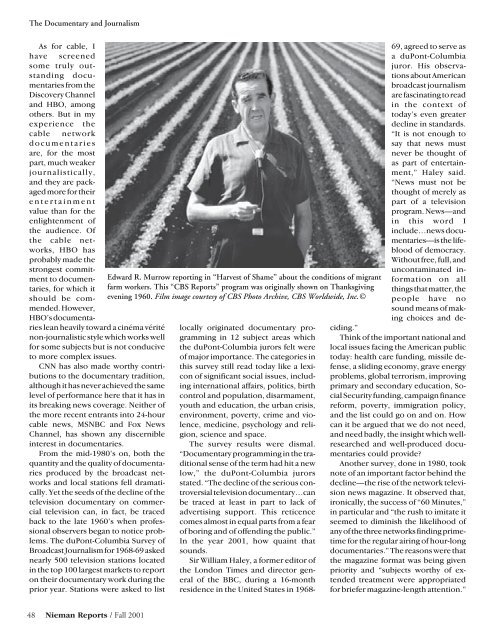Download - Nieman Foundation - Harvard University
Download - Nieman Foundation - Harvard University
Download - Nieman Foundation - Harvard University
Create successful ePaper yourself
Turn your PDF publications into a flip-book with our unique Google optimized e-Paper software.
The Documentary and JournalismAs for cable, Ihave screenedsome truly outstandingdocumentariesfrom theDiscovery Channeland HBO, amongothers. But in myexperience thecable networkdocumentariesare, for the mostpart, much weakerjournalistically,and they are packagedmore for theirentertainmentvalue than for theenlightenment ofthe audience. Ofthe cable networks,HBO hasprobably made thestrongest commitmentto documentaries,for which itshould be commended.However,HBO’s documentarieslean heavily toward a cinéma vériténon-journalistic style which works wellfor some subjects but is not conduciveto more complex issues.CNN has also made worthy contributionsto the documentary tradition,although it has never achieved the samelevel of performance here that it has inits breaking news coverage. Neither ofthe more recent entrants into 24-hourcable news, MSNBC and Fox NewsChannel, has shown any discernibleinterest in documentaries.From the mid-1980’s on, both thequantity and the quality of documentariesproduced by the broadcast networksand local stations fell dramatically.Yet the seeds of the decline of thetelevision documentary on commercialtelevision can, in fact, be tracedback to the late 1960’s when professionalobservers began to notice problems.The duPont-Columbia Survey ofBroadcast Journalism for 1968-69 askednearly 500 television stations locatedin the top 100 largest markets to reporton their documentary work during theprior year. Stations were asked to listEdward R. Murrow reporting in “Harvest of Shame” about the conditions of migrantfarm workers. This “CBS Reports” program was originally shown on Thanksgivingevening 1960. Film image courtesy of CBS Photo Archive, CBS Worldwide, Inc.©locally originated documentary programmingin 12 subject areas whichthe duPont-Columbia jurors felt wereof major importance. The categories inthis survey still read today like a lexiconof significant social issues, includinginternational affairs, politics, birthcontrol and population, disarmament,youth and education, the urban crisis,environment, poverty, crime and violence,medicine, psychology and religion,science and space.The survey results were dismal.“Documentary programming in the traditionalsense of the term had hit a newlow,” the duPont-Columbia jurorsstated. “The decline of the serious controversialtelevision documentary…canbe traced at least in part to lack ofadvertising support. This reticencecomes almost in equal parts from a fearof boring and of offending the public.”In the year 2001, how quaint thatsounds.Sir William Haley, a former editor ofthe London Times and director generalof the BBC, during a 16-monthresidence in the United States in 1968-69, agreed to serve asa duPont-Columbiajuror. His observationsabout Americanbroadcast journalismare fascinating to readin the context oftoday’s even greaterdecline in standards.“It is not enough tosay that news mustnever be thought ofas part of entertainment,”Haley said.“News must not bethought of merely aspart of a televisionprogram. News—andin this word Iinclude…news documentaries—isthe lifebloodof democracy.Without free, full, anduncontaminated informationon allthings that matter, thepeople have nosound means of makingchoices and deciding.”Think of the important national andlocal issues facing the American publictoday: health care funding, missile defense,a sliding economy, grave energyproblems, global terrorism, improvingprimary and secondary education, SocialSecurity funding, campaign financereform, poverty, immigration policy,and the list could go on and on. Howcan it be argued that we do not need,and need badly, the insight which wellresearchedand well-produced documentariescould provide?Another survey, done in 1980, tooknote of an important factor behind thedecline—the rise of the network televisionnews magazine. It observed that,ironically, the success of “60 Minutes,”in particular and “the rush to imitate itseemed to diminish the likelihood ofany of the three networks finding primetimefor the regular airing of hour-longdocumentaries.” The reasons were thatthe magazine format was being givenpriority and “subjects worthy of extendedtreatment were appropriatedfor briefer magazine-length attention.”48 <strong>Nieman</strong> Reports / Fall 2001
















